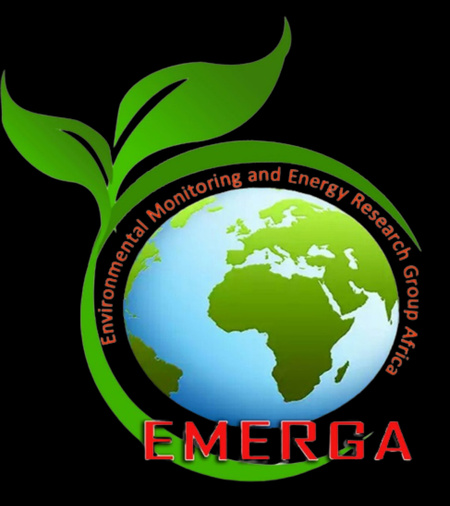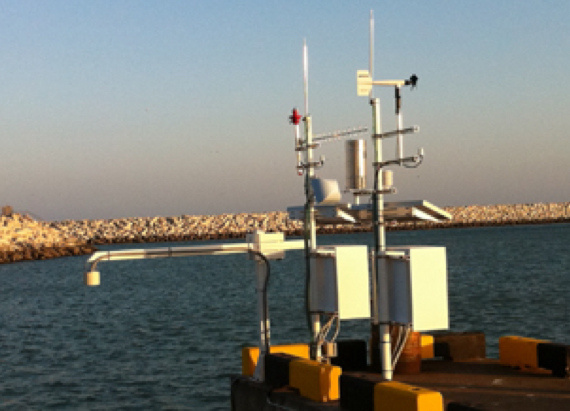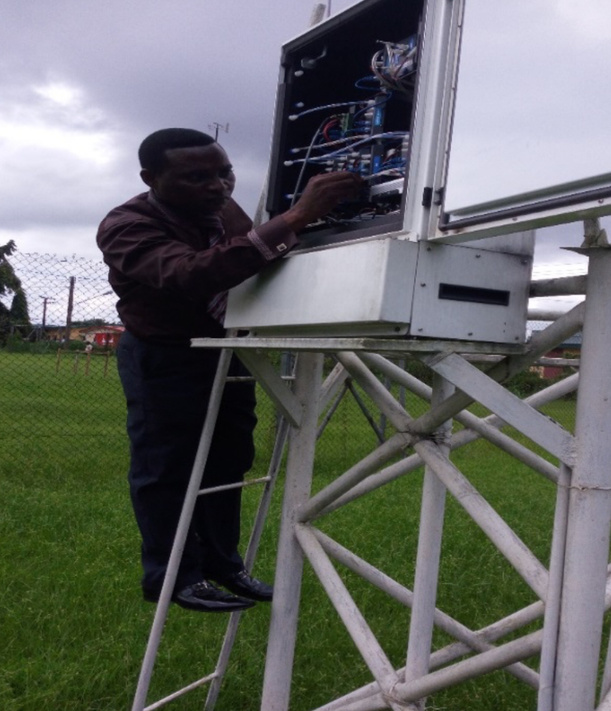
ENVIRONMENTAL MONITORING AND ENERGY RESEARCH GROUP AFRICA, EMERGA
Delivering a sustainable future!

Welcome to EmErga
EMERGA is a collaborative community of researchers, students, core professionals across Universities and Industries and Government Agencies all over the world. It is a world-need program with an African bias, structured to fill the gap of indigenous research efforts in the global search for sustainable development in the health, environment and energy sectors. We work across disciplines and departments to create transformative knowledge for the environment and its people. Our vision is to expand scientific knowledge and develop innovative strategies and technologies that will strengthen Africa’s role in creating indigenous solutions to its numerous energy and environmental needs. The group is interested in five core areas of research in Environmental Science and Energy Technology which are Atmospheric, Earth and Aquatic Sciences, Ecosystem Science, environmental data science and systems, renewable energy systems, human health and environmental analysis.

In this field the group’s interest is to create new knowledge across multiple scales to aid decision-makers on the management of air, water, and land resources.

At the renewable energy levels, we consider analyses that will produce tools that address key issues at the intersection of environment, energy, science, technology, society, and policy..

We conduct analyses to assess emerging technologies and products and develop methods for identifying and managing the hazards of energy projects, as well as the disposition of their related wastes.
Energy is the livewire of today’s society and economy. Our work, leisure, and our economic, social and physical wellbeing all depend on the sufficient, uninterrupted supply of energy. In spite of the obvious negative impact of current energy systems to the environment, the demand for energy continues to grow, year after year. Traditional energy sources such as fossil fuels are hurting the environment. Besides, they are limited in quantity and the growing gap between increasing demand and shrinking supply will have to be filled by alternative primary energy sources. We are therefore constrained to seek and strive to make energy supply safer and more sustainable in order to avoid the negative impacts of global climate change, the growing risk of supply disruptions, price volatility and air pollution that are associated with today’s energy systems
The energy policy at the international scene advocates securing energy supply while at the same time reducing emissions that are associated with pollution and climate change. There have been calls to inhibit the emission of greenhouse gases and promote environment friendly energy sources, employ alternative fuels for transport as well as increase energy efficiency. Though carbon credit and public advocacy are attempts at preserving the natural environment, the exercise is still very far from the goal as the demand for land, timber and fuel wood continue to out grow conservation efforts.
A coherent energy strategy is required to address both energy supply and demand, taking into account the whole energy life-cycle including fuel production, transmission and distribution, and energy conversion, and the impact on energy equipment, manufacturers and the end-users of energy systems. In the short term, the focus should be higher energy efficiency and increase supply in renewable energy systems.
To conserve the global environment and achieve a sustainable society, it is necessary to limit the exploitation of the natural environment to a level within the Earth’s self-recovery capabilities. To meet this requirement, every part of the world must be actively involved in a vision that promotes environmental conservation. Concerted efforts aimed at developing energy systems with enhanced conversion factors must be backed up with research funding from within and supported by international donor agencies which could come as aids to weaker societies. This strategy is urgent because current renewable energy systems have failed to deliver adequate supply of energy to a society whose energy needs are growing by leaps and bounds.
About us
EMERGA is composed of a diverse and complementary array of professionals and service providers including Scientist, Engineers, Environmentalist, Information Experts, regulatory experts, and laboratories. From these experts we form research teams with specific mandates and projects to execute. The teams also work with our clients’ and funding agencies’ special needs, assuring project completion in a timely and most cost effective manner. We provide a wide range of intelligent management, specialized consulting, and technical services in the energy and environmental fields.
EMERGA research group is strongly pragmatic, evidence-based and scientific; its interdisciplinary composition encourages inter faculty and inter university based research. It also encourages national and international collaborations. The effect of such a combination is hard to quantify. Our approach integrates field and laboratory methods with the development of new theory, modelling, data systems, policy analysis, and evaluation to create solutions to complex environmental and energy challenges.
EMERGA network of alliances makes it possible to provide the widest range of “strategically and technologically available” services and reliable research work. Our environmental services include special expertise in environmental impact assessment, environmental auditing, remediation of energy related pollution including their community relations’ component and development of energy systems.



PROF. IGWE O. EWONA
EXECUTIVE DIRECTOR/ LEAD RESEARCHER
Igwe Ewona is a Professor of Atmospheric and Energy Physics with extensive research interest in air quality, pollutionepidemiology, climate change and mitigation. He is a winner of over 18 research grants, notably, the TETfund NRF research grant of 2014, where he and his team worked on "Characterization of Air Quality Parameters in the Niger Delta Area of Nigeria." The results show elevated concentrations of PM2.5 and PM10 generally believed to be responsible for several respiratory and heart related diseases. He is presently the Director, Directorate of Research and Development, Cross River University of Technology, Calabar where he has mobilzed over 100 IBR research grants to his University within two years in office. He is passionate about contributing to finding solutions to national issues. In 2020 grant cycle his NRF concept note was accepted but the project could not be funded citing paucity of funds. He believes that the current project will contribute to the United Nation’s sustainable development goals in the area of Health and wellbeing.
Prof. Ewona pioneered environmental monitoring and energy research group which has recently targeted atmospheric pollution through strategic project development and these have earned them some grant support.
GRANTS WON
1. TETFund National research fund NRF on “Determination Of Air Quality Dependent Mortality And Loss Of Life Expectancy In Nigeria " (About N21,000,000).Dec. 2022 - Project is ongoing.
2. Evaluation of Trace Metals in Particulate Matter from the Ambient Air of Calabar Metropolis, Cross River State, (TETFund IBR Research Grant Worth N1,300,000). Ewona, Igwe (PI) and Iwara Ibor2022 - Project completed and closed out
3. Effects of meteorological parameters and path Attenuation on VHF and UHF (TETFund IBR Research Grant Worth N1,359,000). Joel Iloke (PI) andEwona, Igwe 2022 - Project completed and closed out
4. TETFund National research fund NRF on “Characterization of Air Quality Parameters in the Niger Delta Area of Nigeria " (About N32,214,000). 2014 - Project completed and closed out
5. RESEARCH GRANT: Characterization of air Quality Parameters in the Niger Delta Region of Nigeria. (TETfund NRF Research Grant through University of Calabar N32,300,000) 2014

FIELD WORK
Prof. Ewona is actively engaged in fundamental and applied research in Environmental Science and technology as well as Renewable energy technologies.
In this plate Prof. Igwe O. Ewona is setting up the air quality monitoring equipment (AQM65) for operation at the Geo-Environmental Field station in the University of Calabar, Calabar- Nigeria.
Prof. Igwe O. Ewona on field work with a cross section of his Post Graduate students. He is a consultant on environmental and energy issues. He welcomes collaborative research on a broad spectrum of interest and from any part of the world.

Prof. RABIU, keem Babatunde
Prof. RABIU, keem Babatunde is an erudite Professor of upper Atmospheric Physics, who has done extensive work on the Physics of the upper atmosphere. As the Director of the Centre for Atmospheric research, he has collaborated on several projects relating to air pollution. He is presently redeployed as the Executive Director of the UN African Regional Centre for Space Science and Technology Education in English (UN-ARCSSTE-E) affiliated to the United Nations Office for Outer Space Affairs (UNOOSA). The UNOOSA was mandated to establish Centres for Space Science and Technology Education in developing countries on a regional basis. He has had several visiting research fellowships from foreign universities. He has also managed and participated in over 14 external research grants including the Equipment grant for Magnetic Data Acquisition System MAGDAS worth 2.2 million US dollars and the US NSF Equipment grant for Super Dual Equatorial Radar Network valued at 2.0 million US dollars. He has installed over ten purple air and clarity pollution measuring equipment in each of the six geopolitical zones of Nigeria and pledges to deploy them for this project when funded.
Prof. Sunday O. Udo
Prof. Sunday O. Udo major research interests are in Atmospheric and Environmental Physics which basically involve the applications of Physics in understanding processes and solving problems relating to the Earth’s atmosphere and its associated systems. He is strongly motivated by new challenges and eager to learn and apply new techniques in research.
Dr Vincent Uhegbu
Dr Vincent Uhegbu, is a practicing medical doctor who has worked extensively with others on respiratory and heart related diseases, particularly on Ventricular Diastolic Function in Patients with Type 2 Diabetes Mellitus, Emerging Cardiovascular Diseases in Nigeria and Cardiovascular Risk Factors for Sudden Cardiac Death in our Environment (an IBR TETFUND project).
Theresa Ewona
Theresa Ewona is a very diligent female lecturer who as an early career lecturer has shown great interest and early evidence in research. She has won three research grants in Environmental studies and tourism.
Lady, Bisong-Achu, M. K
Lady, Bisong-Achu, M. K has been engaged with engineering properties of clay, such asClay-based Geopolymers, Reinforced with Coir Fibres, Utilization of Metakaolin Clay-based Geopolymers for High Temperature Application, which have been published in reputable peer review journals. She is a member of several Professional bodies such as
• Council for the Regulation of Engineering in Nigeria
• Member Nigerian Society of Engineers
• Member Nigerian Institution of Mechanical Engineers
• Member Association of Professional Women Engineers
Prof. Iniodu George Ukpong
Prof. Iniodu George Ukpong is a Professor of Environmental and Public health Parasitology in the Department of Animal and Environmental Biology, Faculty of Biological Sciences, University of Cross River State. A Seasoned scholar and widely published researcher, his current research interest spans One health, Disaster parasitology, Applications of geographic information systems (GIS) in epidemiology, risk mapping and management of parasitic tropical diseases; Environmental and Community-based control of parasitic infections; and aspects of environmental management / sustainable development in the Niger Delta. He has a career specialty in environmental impact assessment / Health impact assessment and community health studies. Dr Ukpong pioneers a global academic discuss and research inquiry in Disaster Parasitology as a novel concept; and its application in disaster management; (www.journalsajp.com/index.php/SAJP/). He is member, Parasitology and Public Health Society of Nigeria (PPSN), African Research Network for Neglected Tropical Diseases (ARNTD), Biopesticides Society of Nigeria (BpSN), Nigerian Environmental Society (NES), Association of Nigerian Authors (ANA). He authors the book “Nature under Siege: Portrait of Environmental Crisis in the Niger Delta”, (Author house, USA, 2012). He has previously held various positions of responsibility in the University, including Head, Department of Animal and Environmental Biology, Sub-dean, Faculty of Science and Coordinator, Students Industrial Work Experience Scheme.
Ekong, Mercy Okon is a lecturer in the Department of Microbiology, Faculty of Biological Sciences, Cross River State University (UNICROSS), Calabar. She holds a first Degree in Microbiology (CRUTECH), Master of Science in Microbiology and Immunology from University of Nottingham (UK). Her area of research includes; Bacteriological analysis in food and health-related issues. Immune response to respiratory infections with special preference to Tuberculosis.
She is an awardee of TetFund scholarship for Masters Training,University of Nottingham and presently awarded TetFund and Forum for Agricultural Research in Africa (FARA) scholarship for post graduate (Ph.D.) study in BRAZIL.
She is a beneficiary of the TEFund Institution Based Research Grant (IBR) for analysis of prevalence of Tuberculosis, cytokine expression in latent and overt TB individuals in Cross River State.She has supervised more than 100 undergraduate research workand 1 PGD student. She is the present seminar and project coordinator in the Department of Microbiology UNICROSS. She ispassionate about contributing and providing solutions to health-related issues as well as identifying and mitigating microbial food spoilage agents which is the major caused of food scarcityworldwide.
Ekong, Mercy Okon

Phone
+234 8035802720
emergafri@gmail.com
Office address
5, Oceanic Science block,
University of Cross River State,
Calabar -Nigeria.